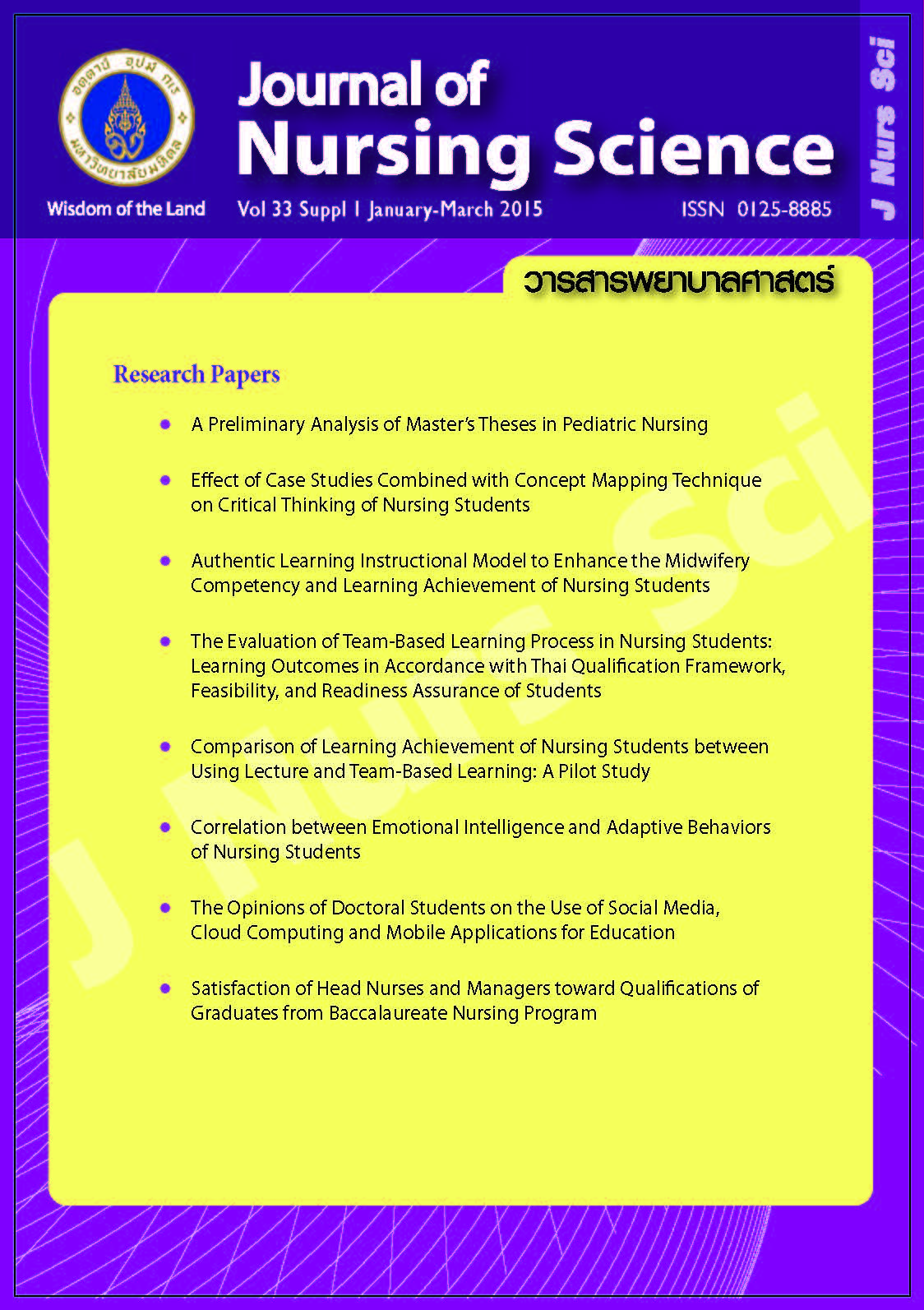Effect of Case Studies Combined with Concept Mapping Technique on Critical Thinking of Nursing Students
Main Article Content
Abstract
Purpose: This study aimed to examine the effect of utilizing techniques of case studies combined with concept mapping on the critical thinking ability of nursing students.
Design: A quasi-experimental research.
Methods: The study sample consisted of 91 second-year nursing students who participated in teaching/learning program, using case studies combined with concept mapping (CSCM program), in pathophysiology course. Data were collected using the Praboromarajchanok Institute’s Critical Thinking Appraisal, and open-ended questions were used to assess students’ perception of the CSCM program. Quantitative data were analyzed using descriptive statistics and the hypothesis was tested using the paired t-test. The reflective data were analyzed through content analysis.
Main findings: There was no statistical difference between the mean scores of critical thinking ability before and after implementing the CSCM program. However, content analysis based on students’ perception of the program revealed that these teaching techniques helped enhance the students’ competency in developing thinking and being an active learner.
Conclusion and recommendations: Although the 4-week CSCM program was shown no effect to enhance nursing critical thinking of nursing students, it is useful to promote students in developing their thinking process and in becoming active learners. Findings of this study indicate that the research on the CSCM program’s effect on critical thinking should be conducted with a control group experimental and randomization in longer period or longitudinal study design.
ผลของการจัดการเรียนรู้โดยใช้กรณีศึกษาร่วมกับแผนผังแนวคิดต่อการคิดอย่างมีวิจารณญาณของนักศึกษาพยาบาล
บทคัดย่อ
วัตถุประสงค์: ศึกษาผลของการจัดกาเรียนรู้โดยใช้กรณีศึกษาร่วมกับแผนผังแนวคิดต่อการคิดอย่างมีวิจารญาณของนักศึกษาพยาบาล
รูปแบบการวิจัย: การวิจัยกึ่งทดลอง
วิธีดำเนินการวิจัย: กลุ่มตัวอย่างเป็นนักศึกษาพยาบาล ชั้นปีที่ 2 จำนวน 91 คน ซึ่งเข้าร่วมกิจกรรมการเรียนการสอนโดยใช้กรณีศึกษาร่วมกับแผนผังแนวคิด ในรายวิชาพยาธิสรีรวิทยา เก็บรวบรวมข้อมูลโดยใช้แบบประเมินความสามารถในการคิดอย่างมีวิจารณญาณของสถาบันพระบรมราชชนก และใช้คำถามสะท้อนคิดชนิดปลายเปิดประเมินการรับรู้ของนักศึกษาต่อรูปแบบการจัดการเรียนรู้โดยใช้กรณีศึกษาร่วมกับแผนผังแนวคิด วิเคราะห์ข้อมูลเชิงปริมาณโดยใช้สถิติเชิงพรรณนา และทดสอบสมมติฐานโดยใช้สถิติ Paired t-test ข้อมูลจากการสะท้อนของนักศึกษาใช้การวิเคราะห์ข้อมูลเชิงเนื้อหา
ผลการวิจัย: ความสามารถในการคิดอย่างมีวิจารณญาณของนักศึกษาพยาบาลก่อนและหลังการจัดการเรียนรู้แบบกรณีศึกษาร่วมกับแผนผังแนวคิดไม่แตกต่างกัน อย่างไรก็ตาม การวิเคราะห์ข้อมูลเชิงเนื้อหาเกี่ยวกับการรับรู้ของนักศึกษาต่อรูปแบบการจัดการเรียนการสอนโดยใช้กรณีศึกษาร่วมกับแผนผังแนวคิด พบว่าเทคนิคการสอนดังกล่าวช่วยพัฒนาศักยภาพของนักศึกษา ในประเด็นของการพัฒนากระบวนการคิด และการเป็นผู้เรียนแบบเชิงรุก
สรุปและข้อเสนอแนะ: แม้ว่าการจัดรูปแบบการเรียนรู้โดยใช้กรณีศึกษาร่วมกับแผนผังแนวคิด ในระยะเวลา 4 สัปดาห์ ไม่มีผลต่อการพัฒนาความสามารถในการคิดอย่างมีวิจารณญาณของนักศึกษาพยาบาล การเรียนรู้ในรูปแบบดังกล่าว มีประโยชน์ในการส่งเสริมการพัฒนากระบวนการคิดและพัฒนาศักยภาพผู้เรียนเชิงรุกของนักศึกษา จึงควรมีการทำวิจัยแบบทดลองหรือกึ่งทดลองที่มีกลุ่มเปรียบเทียบ เพื่อศึกษาประสิทธิผลของโปรแกรมในระยะยาวต่อไป
คำสำคัญ: แผนผังแนวคิด กรณีศึกษา การคิดอย่างมีวิจารณญาณ นักศึกษาพยาบาล
Article Details
Copyright Notice: Nursing Science Journal of Thailand has exclusive rights to publish and distribute the manuscript and all contents therein. Without the journal’s permission, the dissemination of the manuscript in another journal or online, and the reproduction of the manuscript for non-educational purpose are prohibited.

Disclaimer: The opinion expressed and figures provided in this journal, NSJT, are the sole responsibility of the authors. The editorial board bears no responsibility in this regard.

